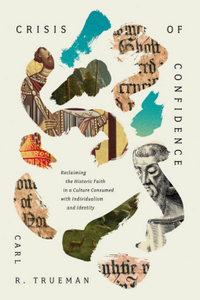 Crisis of Confidence:
Crisis of Confidence:
Reclaiming the Historic Faith
in a Culture Consumed
with Individualism and Identity
DETAILS: Publisher: Crossway Publication Date: February 6, 2024 Format: Hardcover Length: 173 Read Date: March 17-25, 2024

What’s Crisis of Confidence About?
This is a new and slightly updated version of Trueman’s 2012 book, The Creedal Imperative. The updates don’t change the overall thesis of the book, but a new nuance or two are added. The first edition focused on contrasting the point of view of “No creed but the Bible” with the Protestant traditions that embrace the Ecumenical Creeds and Confessions of Faith. This time, the focus is on maintaining Ecclesiastical positions and individual convictions via the Creeds/Confessions in a rapidly changing culture—particularly in light of what Trueman calls “expressive individualism.”
The book begins with a chapter arguing against Creeds and Confessions, which is followed by a chapter providing the Scriptural basis for their creation and use. We then get two chapters looking at the history of them in the Church—one chapter for the development of the Ecumenical Creeds in the first few centuries of the Church, and one looking at the development of Confessions during the Protestant Reformation (with some discussion of non-Reformed Confessions as well).
Trueman wraps up with a chapter on the use of Creeds/Confessions in the worship of the church—to form and frame it, their use in a church’s worship, and how they serve an integral role in both. From there he offers a final chapter with a non-exhaustive list of ways creedal material is useful for particular congregations, denominations, and individuals.
So, what did I think about Crisis of Confidence?
Now, I’d intended on re-reading The Creedal Imperative back in January, but the time got away from me and then this dropped in my lap quite unexpectedly—so I was able to tackle that re-read, in a sense. For that, I’m glad I read this.
I’m not sure it was worth the new edition—and the minor updates didn’t add that much to the book as a whole. It was probably a good move from a publishing/selling point of view—the design makes it fit with Trueman’s last couple of books, and the new focus fits those, too. This is a good way to get people who’ve only read his last two books to read his older material (especially because those books are likely to have been attractive to people who wouldn’t be interested in a book about Creeds/Confessions without that connection).
Did that new material and the updates hurt the book? Nope. It’s still a strong apologetic for the use of them—not just that creedal documents are allowed by the Scriptures, but Trueman argues that they’re necessary, even expected for the Church (and shows indications that the First Century Church employed them). In the anti-Creedal cultures (both secular and ecclesiastical) that the Western Church finds itself in, we need as many of these defenses and arguments for that as we can get.
Trueman delivers those in his typical learned, engaging, and clear style. He doesn’t come out swinging as he does in some contexts—but you don’t walk away wondering what he really thinks about something, either.
I recommend this book and encourage you to read it if you haven’t read the original. if you have—it’s not a bad idea to read this (or just re-read the original), who doesn’t need a refresher on topics like this from time to time?

This post contains an affiliate link. If you purchase from it, I will get a small commission at no additional cost to you. As always, the opinions expressed are my own.
![]()



Read Irresponsibly, but please Comment Responsibly